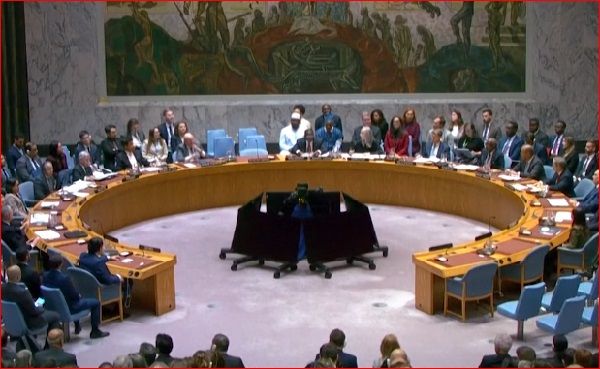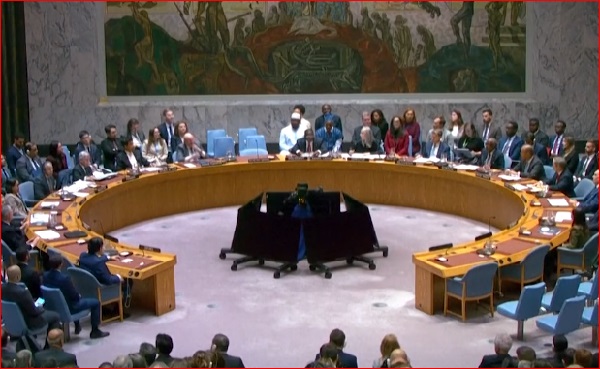
The United Nations Security Council has approved a U.S.-backed resolution supporting former President Donald Trump’s proposals for long-term peace in Gaza. The plan includes deploying an International Stabilisation Force (ISF) and outlining a potential path toward a sovereign Palestinian state.
The resolution passed with 13 votes in favour, while China and Russia abstained. “This resolution charts a new course in the Middle East for Israelis, Palestinians, and the entire region,” said U.S. envoy Mike Waltz during the council session.
Palestinian Statehood Mentioned as Part of Compromise
References to an independent Palestine were included as part of a compromise to secure support from Arab and Islamic nations, who are expected to contribute troops to the proposed ISF.
However, just hours before the vote, Israeli Prime Minister Benjamin Netanyahu reiterated his firm opposition to the establishment of a Palestinian state, raising doubts over Israel’s willingness to implement the UN-backed plan.
Following the vote, Hamas rejected the resolution, calling it an imposed “international guardianship mechanism” and declaring that it would not disarm.
Key Provisions of the Resolution
Supporters of the resolution said that if implemented, it would result in:
Immediate removal of remaining restrictions on humanitarian aid into Gaza
Deployment of an international stabilisation force following Israeli military withdrawal
Progress toward reconstruction
A conditional “pathway to Palestinian self-determination and statehood”
The initial U.S. draft omitted references to Palestinian statehood; however, the final wording remains vague and depends on reforms within the Palestinian Authority and progress made in rebuilding Gaza.
Mixed Reactions from Member States
UK representative James Kariuki said the transitional measures “must be implemented in accordance with international law and in respect of Palestinian sovereignty.”
Algeria, speaking on behalf of the Arab bloc, supported the resolution after securing what it described as essential amendments. Algerian ambassador Amar Bendjama said the annexe to the resolution clearly affirms: “no annexation, no occupation, no forced displacement.”
Concerns Over Implementation
Netanyahu reportedly agreed to the resolution’s language during discussions with Washington but reversed his stance amid pressure from far-right members of his coalition. “Our opposition to a Palestinian state on any territory has not changed,” Netanyahu said.
The resolution marks a rare moment of unity on Gaza after years of deadlock, during which more than 71,000 Palestinians have been killed. However, its ambiguity left many aspects unresolved.
A “Board of Peace,” to be chaired by Donald Trump, will oversee implementation, though its membership and powers remain unclear. The board will report to the UN but will not be bound by the UN or the Palestinian Authority.
A proposed Palestinian technocratic committee is expected to govern day-to-day affairs in Gaza, though its composition remains undecided.
Uncertain Future for International Stabilisation Force
The ISF’s mandate includes dismantling armed groups in Gaza, including Hamas, but no country has yet committed troops. With Hamas refusing to disarm, the possibility of direct confrontation between the ISF and Hamas remains a major concern.
European diplomats emphasised the need to quickly agree on the members of the Palestinian technocratic committee and clarify the criteria for Palestinian Authority reforms.
UN Security Council Endorses Donald Trump’s Gaza Peace Plan
Resolution Passes 13–0, China and Russia Abstain
The United Nations Security Council has approved a U.S.-backed resolution supporting former President Donald Trump’s proposals for long-term peace in Gaza. The plan includes deploying an International Stabilisation Force (ISF) and outlining a potential path toward a sovereign Palestinian state.
The resolution passed with 13 votes in favour, while China and Russia abstained. “This resolution charts a new course in the Middle East for Israelis, Palestinians, and the entire region,” said U.S. envoy Mike Waltz during the council session.
Palestinian Statehood Mentioned as Part of Compromise
References to an independent Palestine were included as part of a compromise to secure support from Arab and Islamic nations, who are expected to contribute troops to the proposed ISF.
However, just hours before the vote, Israeli Prime Minister Benjamin Netanyahu reiterated his firm opposition to the establishment of a Palestinian state, raising doubts over Israel’s willingness to implement the UN-backed plan.
Following the vote, Hamas rejected the resolution, calling it an imposed “international guardianship mechanism” and declaring that it would not disarm.
Key Provisions of the Resolution
Supporters of the resolution said that if implemented, it would result in:
Immediate removal of remaining restrictions on humanitarian aid into Gaza
Deployment of an international stabilisation force following Israeli military withdrawal
Progress toward reconstruction
A conditional “pathway to Palestinian self-determination and statehood”
The initial U.S. draft omitted references to Palestinian statehood; however, the final wording remains vague and depends on reforms within the Palestinian Authority and progress made in rebuilding Gaza.
Mixed Reactions from Member States
UK representative James Kariuki said the transitional measures “must be implemented in accordance with international law and in respect of Palestinian sovereignty.”
Algeria, speaking on behalf of the Arab bloc, supported the resolution after securing what it described as essential amendments. Algerian ambassador Amar Bendjama said the annexe to the resolution clearly affirms: “no annexation, no occupation, no forced displacement.”
Concerns Over Implementation
Netanyahu reportedly agreed to the resolution’s language during discussions with Washington but reversed his stance amid pressure from far-right members of his coalition. “Our opposition to a Palestinian state on any territory has not changed,” Netanyahu said.
The resolution marks a rare moment of unity on Gaza after years of deadlock, during which more than 71,000 Palestinians have been killed. However, its ambiguity left many aspects unresolved.
A “Board of Peace,” to be chaired by Donald Trump, will oversee implementation, though its membership and powers remain unclear. The board will report to the UN but will not be bound by the UN or the Palestinian Authority.
A proposed Palestinian technocratic committee is expected to govern day-to-day affairs in Gaza, though its composition remains undecided.
Uncertain Future for International Stabilisation Force
The ISF’s mandate includes dismantling armed groups in Gaza, including Hamas, but no country has yet committed troops. With Hamas refusing to disarm, the possibility of direct confrontation between the ISF and Hamas remains a major concern.
European diplomats emphasised the need to quickly agree on the members of the Palestinian technocratic committee and clarify the criteria for Palestinian Authority reforms.
Trump Hails Vote
Donald Trump celebrated the Security Council decision as “a moment of true historic proportion.” He announced that the members of the Board of Peace, along with “many more exciting updates,” will be revealed in the coming weeks.
Donald Trump celebrated the Security Council decision as “a moment of true historic proportion.” He announced that the members of the Board of Peace, along with “many more exciting updates,” will be revealed in the coming weeks.
About Author
You may also like
-
T20 World Cup 2026 : England Beat Italy by 24 Runs, Enter Super 8
-
Blackbuck Poaching Case: Justice Sandhu Recuses; Advocate Mahipal Vishnoi Says Legal Fight Will Continue Until All Accused Are Punished
-
8 AM Metro Starring Saiyami Kher and Gulshan Devaiah Streams on OTT, Actress Calls It Close to Her Heart
-
Rohit Shetty Firing Case : Accused Arrested from Agra Sent to Custody Till February 25, Deepak Opened Fire
-
T20 World Cup: India Crush Pakistan by 61 Runs in Colombo Thriller

